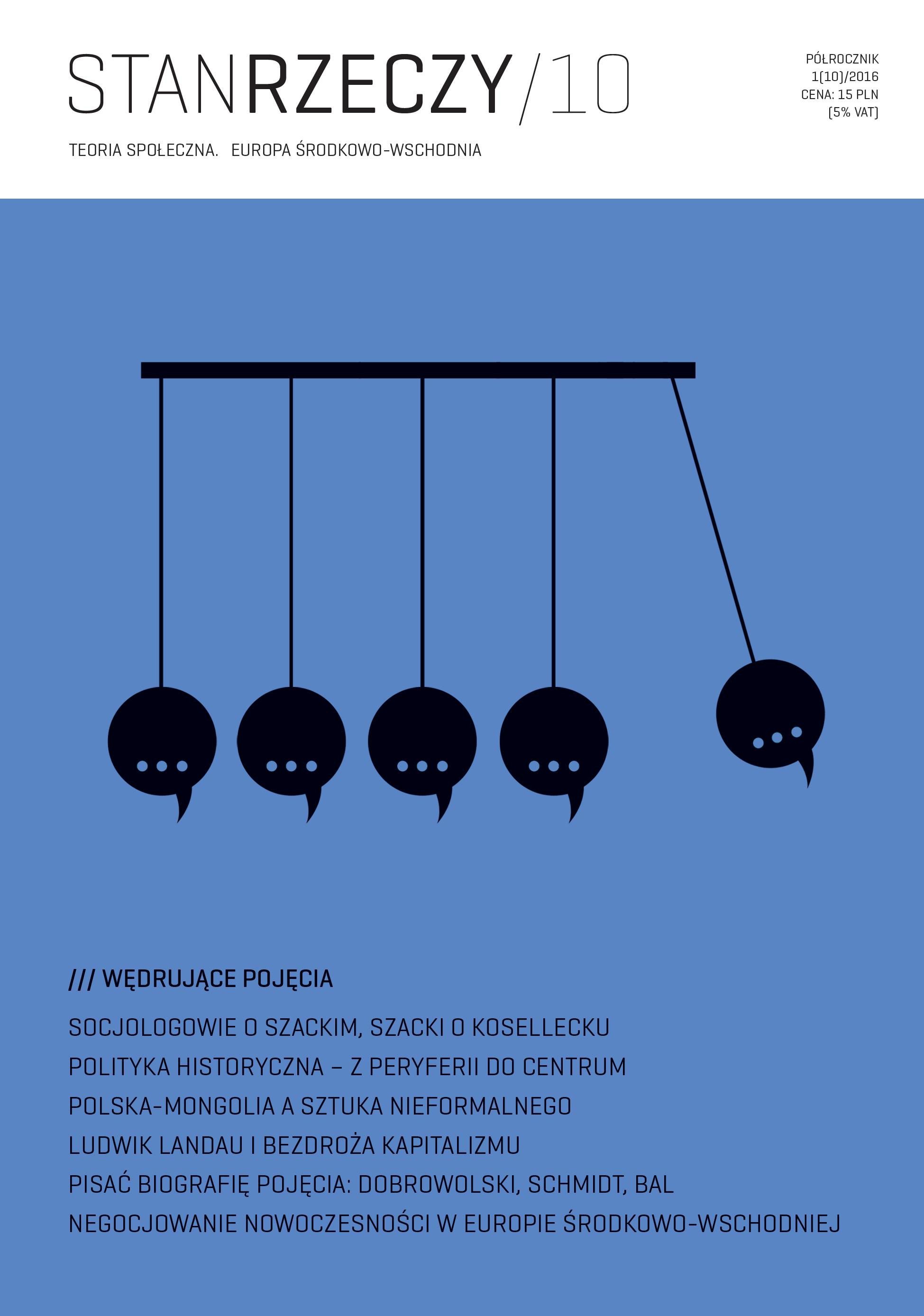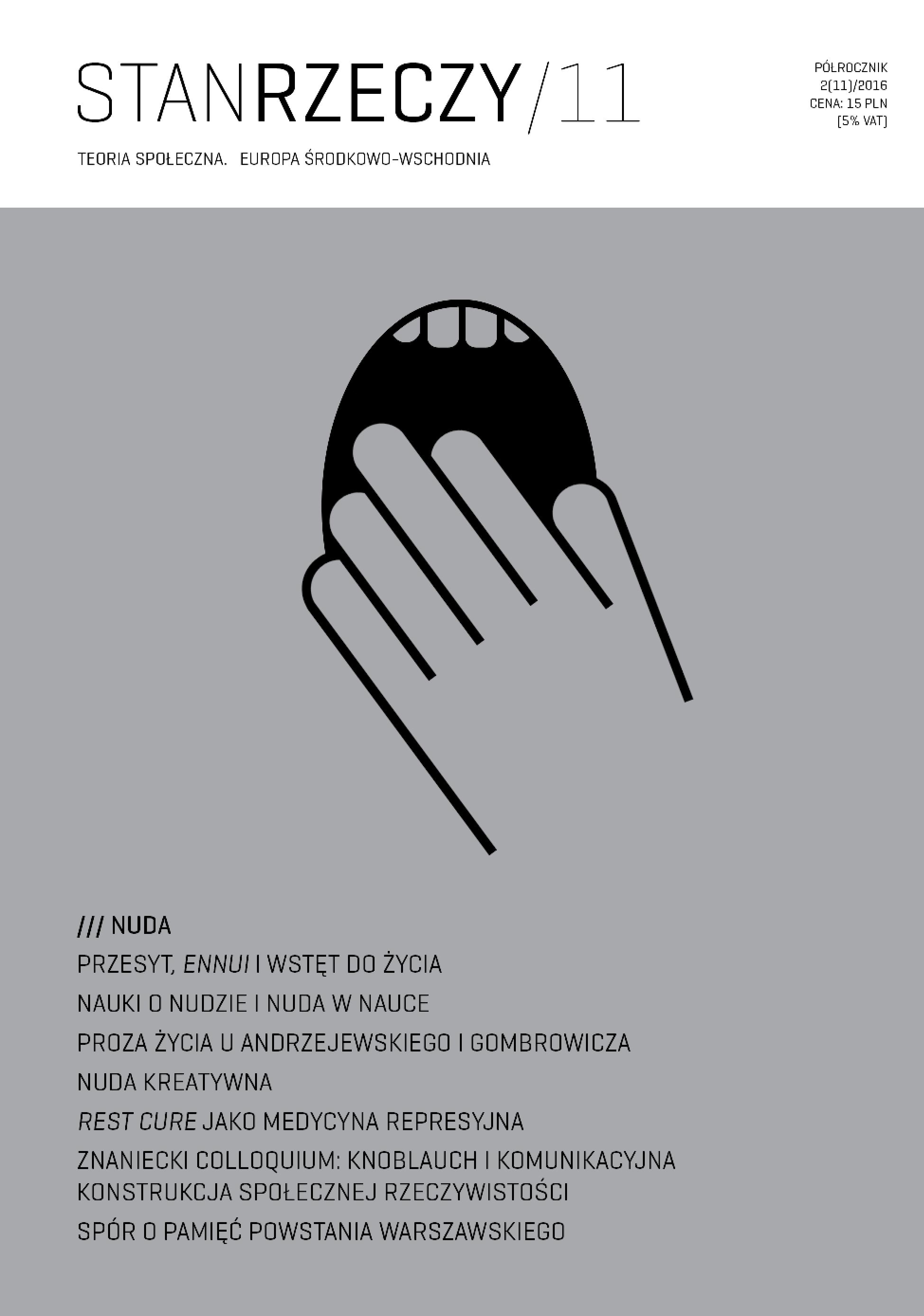
We kindly inform you that, as long as the subject affiliation of our 300.000+ articles is in progress, you might get unsufficient or no results on your third level or second level search. In this case, please broaden your search criteria.










The phenomenon of boredom, which people know from experience, is also an object of study in various disciplines, including philosophy. The authors consider an essential component of boredom to be the feeling of senselessness, of emptiness. Ordinarily, it is thought that what is banal, repetitive, unvaried, or devoid of the element of surprise is boring. A philosophical analysis of boredom, showing its various aspects, turns out in this context not to be boring – the views of various authors, including Kierkegaard, Wolter, Nietzsche, Heidegger, Svendsen, Kołakowski, and Gadacz form paradoxes of sorts, full of the elements of contrast and apparent contradiction.
More...
Using the writings of Jean-Paul Sartre, Emil Cioran, and Ferdinand Pessoa as examples, the author proves that boredom is one of the most important signs of modernism. It duplicates a feature ascribed to modern¬ist movements or groups of movements, and to the era itself – indetermi¬nacy. The author presents a kind of “phenomenology of boredom” that can be derived from the works of these three writers and points out its “bordering” status: It is an experience that takes place at the meeting point of physiology and will, causing a feeling of the excess of existence, the senselessness of being, or the absurdity of the world. Boredom acts on the subject destructively, fragmenting its identity, undermining its substantial¬ity, and bringing to light its internal otherness. As a phenomenon specific to modernism, it can be compared with anomy and nihilism, with which it produces a “modern triad” – a set of unavoidable modern experiences. The last part of the article proves that boredom is also a kind of deconstruc¬tion of the subject: a visceral “foundation” of existence that both initiates the construction of identity and prevents the successful completion of this process.
More...
This article presents the connections between the emotions of dis¬gust and boredom. For this purpose, the author refers to the findings of psychology of the emotions (including evolutionary psychology), linguistic connections, and literary and philosophical ideas. The relationship between boredom and disgust is shown on two complementary and interconnected levels: the feeling of oversatiation, and disgust for the world and one’s self – including its most radical form, disgust for existence itself. The article makes use of Jean-Paul Sartre’s concepts of taedium vitae, ennui, and nausea.
More...
This paper is an endeavor to reconstruct the meanings ascribed to boredom and the category of “boring person.” The first part of the paper is a short summary of the most important findings appearing in the lit¬erature on the subject, with a stress on the elitism and democratization of boredom. The second part concerns the main findings of the author’s own research: the traits and behaviors of contemporary bores and the values attached to them. In the third part, the situational aspects, relativity, and ambivalence of the phenomenon of boredom are discussed.
More...
This article consists of a cultural analysis of the nineteenth-century influence that forced female patients diagnosed with neurasthenia to rest from intellectual and domestic activity. The history of Weir Mitchell’s “rest cure”, which was designed for women suffering from nerves, is the context for an interpretation of C. P. Gilman’s short story “The Yellow Wallpaper”. The theory of illness proposed by the famous medical doctor was evident¬ly correlated with gender. Although the description of the therapy (rest, diet, massages) sounds trivial, Mitchell became the evil character of the American writer’s tale. The story shows how a strict “boredom therapy” drives the narrator to madness. The rest cure reveals the repressive side of medicine, and the resultant boredom – a pivotal point of the treatment – is a boredom that kills. There is no room here for rest in the positive sense; there is only boredom, which in this case, has exclusively negative connota¬tions.
More...
The phenomenon of boredom has often been discussed in the field of sociology. Nevertheless, given the close relationship between boredom and some dimensions of affective and cognitive functioning, it is also a focus of psychological research. At the outset, boredom was examined from the perspective of the psychology of work (as a factor disturbing the effective¬ness of work) and psychoanalytic theory (which distinguishes adaptive and pathological forms of boredom). Currently, researchers emphasize that it is possible to distinguish many types of boredom. Distinctions are made us¬ing two kinds of criteria – the causes of boredom (situational versus inter¬nal) and the level of boredom’s negative effects. Researchers also point out that a proneness to boredom can be considered a dimension of individual differences. In the article, the authors present some of the most important theories and research on boredom. They also present psychological meas¬ures of boredom and proneness to boredom.
More...
This article exposes the specific relations between a situational experience of boredom and states of mind described by the author as being con¬strained (blocked) or unconstrained (open). Some researchers in the field of boredom say that “boredom is creative” and explain their claim by the neurological fact that a lower degree of arousal of the brain is associated with a widening of the field of attention, and by the disposition of bored individuals to make distant associations. Other people consider that “bore¬dom is creative” because being bored involves the experience of some situ¬ational limitations that need to be overcome, thus inspiring (previously) bored people to act creatively. The question that emerges here is the fol¬lowing: Should the mental state connected with being bored be described in categories of the experience of constraint or is it rather related to a sense of openness? Hopefully, an analysis of this particular issue will bring us closer to understanding the essential question of the nature of boredom.
More...
In this paper the author tries to analyze the presence of boredom in science and, at the same time, to answer the question of whether science has to be boring (or if it should be boring). Examples from sociology, anthropology, and the history of science are presented. These examples suggest that boredom has repeatedly accompanied successful scientific en¬deavors. The idea of normal science, as proposed by Thomas Kuhn, is used to explain the presence of boredom in science and to argue that boredom and advanced scientific research are in fact inseparable. The analysis makes it possible to draw conclusions about science as well as about boredom. Contrary to what might be suggested by the philosophy of science, monot¬onous, uninteresting, or fragmentary research turns out to play an impor-tant role in science. At the same time, boredom can be seen as a catalyst of change and intellectual advancement. The difference between the feeling of boredom and the value of boring activity is also observed.
More...
This article examines the unconventional approach to boredom in Wi¬told Gombrowicz’s “The Events on the Banbury.” The story takes place on a ship, where an overwhelming ennui, synonymous with an existential impasse, is the result of a clash between two contradictory aspirations – the human need for purity and order, and the urge to transgress the borders of law and identity, which is greatly impacted by the closeness and intensity of the extra-human world. Boredom is a force coming from the realm of unbridled nature and irrational impulses. It is a peril to the integrality of the human “I,” thus the protagonist rejects it in disgust. However, bore¬dom is also an experience that reveals the artificiality of the existing rules and leads to imagining alternatives. On the Banbury, a fantasy produced by boredom provokes the sailors to a mutiny affirming shamelessness and an excess of homoerotic lust.
More...
This article is an analysis of Jerzy Andrzejewski’s short story “The End” (1933) in the context of multiple views of boredom. In Andrzejew¬ski’s text, boredom appears above all in the routine activities the protago¬nist is forced to perform. Because he must continually do the same thing, he experiences negative affects such as anger, helplessness, and hate. The author argues that boredom is an experience stimulated by repetition. Re¬curring situations, events, and feelings force the hero to think about the circumstances in which he finds himself. Although Gielbard perceives his life failure, he is unable to change his fate and overcome his boredom. The experience of boredom determines his difficult family relations, as well as his economic conditions, which he is unable to alter.
More...